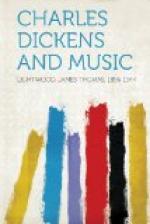Said to be taken from an English ballad in which it is supposed to express the bold and fiery nature of a certain hackney coachman.
According to Notes and Queries (x. 1), this was sung at Winchester School some seventy or eighty years ago.
The following is quoted as the first verse:
Ben he was a coachman rare
(’Jarvey! Jarvey!’
’Here I am, yer honour’),
Crikey! how he used to swear!
How he’d swear, and
how he’d drive,
Number two hundred and sixty-five.
Tamaroo!
Tamaroo! Tamaroo!
Dr. Sweeting, the present music-master at Winchester, says, ’The song “Tamaroo” is quite unknown here now, and if it was sung here seventy or eighty years ago, I should imagine that that was only because it was generally well known. Dickens’ allusion to it seems to suggest that it was a song he had heard, and he utilized its character to label one of his characters in his own fanciful way.’
TARRY TROUSERS (D. & S. 39)
An old folk-song. A mother wants her daughter to marry a tailor, and not wait for her sailor bold, telling her that it is quite time she was a bride. The daughter says:
My mother wants me to wed
with a tailor,
And not give me
my heart’s delight,
But give me the man with the
tarry trousers,
That shine to
me like diamonds bright.
TELL ME, SHEPHERDS (E.D. 2)
Mazzinghi.
Glee. ‘Ye Shepherds, tell me’ (or ’The Wreath’).
THE BRAVE OLD OAK (S.B.S. 2.)
Words by H.F. Chorley. E.J. Loder.
A song for the oak, the brave
old oak,
Who hath ruled
in the greenwood long;
Here’s health and renown
to his broad green crown,
And his fifty
arms so strong!
THE BULL IN THE CHINA SHOP
See p. 111.
THE CHERUB THAT SITS UP ALOFT (U.T. 5)
From ‘Poor Jack.’ C. Dibdin.
For d’ye see, there’s
a cherub sits smiling aloft
To keep watch for the life of Poor Jack.
(Last two lines of verse 3.)
THE CORDIAL THAT SPARKLED FOR HELEN (O.C.S. 61)
Moore’s Irish Melodies.
THE DASHING WHITE SERGEANT (D.C. 28)
Words by General Burgoyne. H.R. Bishop.
If I had a beau, for a soldier
who’d go,
Do you think I’d say
no? No, no, not I.




